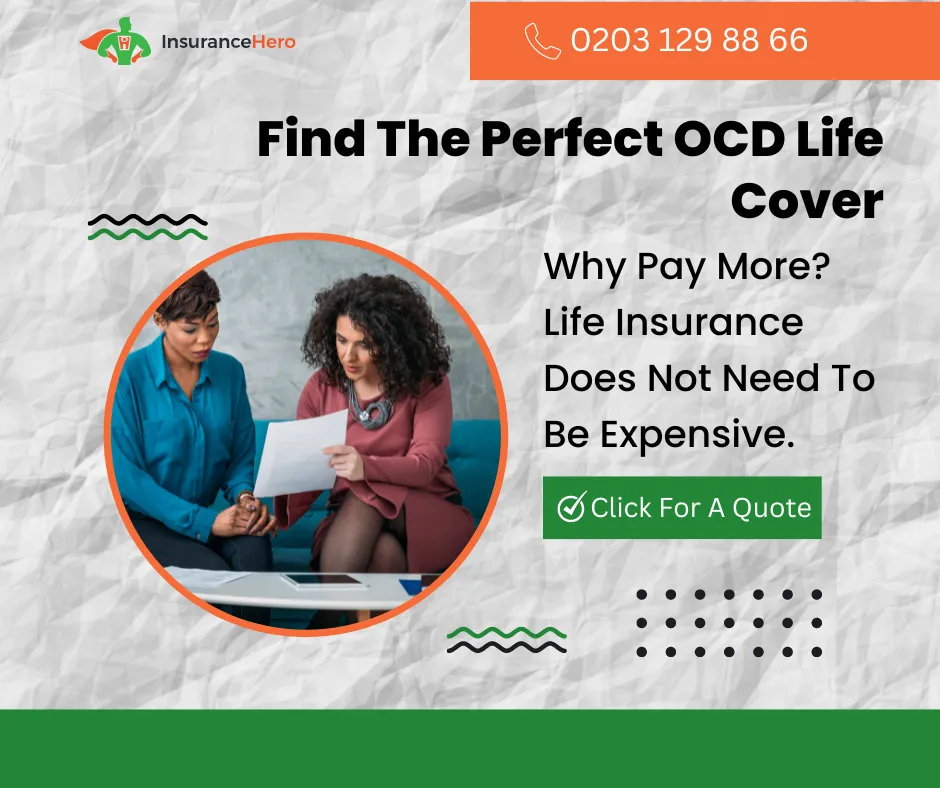A Guide To OCD Life Insurance

Navigating the world of OCD life insurance (Obsessive-Compulsive Disorder ) might seem challenging, but don’t worry – we’ve got you covered.
In this comprehensive guide, we’ll help you understand any potential impact of OCD on life insurance, how to apply for coverage, and tips for managing your mental health to secure the best policy possible.
Short Summary:
- Understand the connection between OCD and life insurance to find suitable coverage.
- Work with an independent agent such as Insurance Hero to compare insurers and be transparent about your diagnosis when applying for a policy.
- For better coverage options, seek professional help, maintain a healthy lifestyle, and understand potential premium increases/exclusions associated with OCD.
Help Protect Your Family’s Future · Compare Top Insurers · Find Your Cheapest Quote


Understanding OCD And Its Impact On Life Insurance
Obsessive-compulsive disorder (OCD) is a mental health condition affecting millions of people worldwide, making it the fourth most common mental health problem globally.
Some life insurance companies can regard OCD as a pre-existing condition, which, in some cases, can influence coverage options and premiums.
Understanding the connection between OCD and life insurance is essential for finding the right policy that meets your needs and provides financial security for your loved ones.
OCD can range from mild to severe, with varying symptoms and treatments. Insurers consider multiple factors when assessing a life insurance application, such as medical history, risk assessment, and physical health.
Consequently, you should know how OCD affects your everyday life and its potential impact on your life insurance policy, premiums, and coverage options.
Defining Obsessive-Compulsive Disorder
Obsessive-Compulsive Disorder (OCD) is an anxiety disorder characterised by intrusive thoughts, feelings, ideas, or sensations (obsessions) and repetitive behaviours or mental acts (compulsions) that individuals feel driven to perform.
Compulsive behaviours are carried out to alleviate the distress caused by intrusive thoughts. For example, excessive hand washing may be a compulsion driven by obsessive thoughts about germs and contamination.
The exact cause of OCD is still unknown, but researchers believe that factors such as:
- Family history
- Low serotonin levels
- Triggering life events
- Certain personality types
May contribute to the development of the disorder. Treatment for OCD typically involves a combination of medication and behavioural therapy, such as cognitive-behavioural therapy (CBT).
Antidepressant medications, like Prozac, Paxil, and Zoloft, are commonly prescribed for individuals with OCD.
The Connection Between OCD and Life Insurance
As mentioned above, when applying for life insurance, some insurers might consider OCD a pre-existing condition that could affect coverage options and premiums.
This means that individuals with OCD may face higher premiums or more restrictive policies, depending on the severity of their condition and its impact on daily life.

Protection is usually available regardless of symptom severity, though some policies may include a mental health exclusion.
During the underwriting process, insurance carriers and underwriters may inquire about an individual’s medical history and treatment relating to OCD.
Providing accurate and complete information about your diagnosis, treatment, and the impact of OCD on your life is essential to ensure that the insurer can properly assess your risk and offer appropriate coverage.
How To Apply For Life Insurance With OCD
Applying for life insurance with OCD requires several steps, including disclosing your diagnosis, providing medical records and treatment information, and working with an independent agent to find the best policy for your needs. Insurance Hero can help you with each of these stages.
Comparing different insurers and understanding their underwriting guidelines can help you identify the policy that best suits your requirements.
It’s essential to be truthful on your life insurance application and provide a comprehensive written explanation of your OCD diagnosis to the insurer.
Being honest and transparent about your condition will help ensure accurate coverage and avoid potential rejection due to non-disclosure.
Disclosing Your OCD Diagnosis
Honesty is the best policy when disclosing your OCD diagnosis on your life insurance application. Being upfront about your condition and describing its impact on your daily life will allow the insurer to accurately assess your risk and offer the most suitable coverage for your needs.
The insurance company may inquire further regarding the condition, including how much it affects daily life and whether the individual has experienced self-harm, suicidal ideation, or a suicide attempt.
When disclosing your OCD diagnosis, it’s important to provide the following information:
- Date of diagnosis
- Treating doctor
- Symptoms
- The severity of the condition
This information will help the insurer better understand your situation and make an informed decision about your coverage.

Gathering Medical Records and Treatment Information
Furnishing comprehensive medical records and treatment information is crucial when applying for life insurance with OCD.
Insurers require details such as:
- The date of diagnosis
- The treating doctor
- The symptoms and severity of the condition
- Access to recent medical records
- Information about recent illnesses and treatments
Providing this information helps insurers assess your risk and offer appropriate coverage tailored to your needs.
Remember that withholding information or providing inaccurate details can lead to potential issues with your coverage, including rejection or cancellation of the policy.
Gather your medical records and treatment information thoroughly and honestly to ensure a smooth application process and accurate coverage.
Working with an Independent Agent
Collaborating with an independent agent like Insurance Hero when applying for life insurance with OCD can be incredibly beneficial. We have access to multiple insurance providers and can help you navigate the application process and find the policy that best meets your requirements.
We can also assist you in identifying the most cost-effective life insurance companies, reducing the premiums you pay and the time you spend applying to companies that may not approve the policy or offer it at a high rate.
By working with us, you can save time, money, and effort in finding the right life insurance policy.
Navigating Life Insurance Premiums and Coverage Options
Understanding the differences between standard and guaranteed acceptance policies and the potential premium increases and exclusions is important for people with OCD looking to secure the right cover.
Here are some points to consider:
- Standard policies typically require applicants to answer medical questions and submit medical records.
- Guaranteed acceptance policies do not require medical questions or records.
- Standard policies may have higher premiums and more exclusions than guaranteed issue policies.
In some cases, premiums for individuals with OCD may be slightly higher than standard due to the increased risk associated with the condition.
Standard vs Guaranteed Acceptance Policies
For individuals with mild to moderate OCD, standard life insurance policies may be available, while more severe cases may necessitate guaranteed issue policies.
Standard policies require applicants to answer medical questions and submit medical records, whereas guaranteed acceptance policies do not necessitate a medical exam or health inquiries.
However, guaranteed acceptance policies typically have higher premiums, reduced death benefits, and a waiting period before the death benefit is paid.
Best Life Insurance Companies For People With OCD
Finding the right life insurance company for people with OCD can be a daunting task, but there are top companies that offer tailored policies and affordable rates.
Prudential, AIG, and Vitality are often considered top choices for life insurance coverage for individuals with OCD.
These companies understand individuals’ unique challenges with OCD and are more likely to offer coverage options that cater to your specific needs.
By working with the Insurance Hero team and comparing policies from these top life insurance companies, you can find the policy that best meets your needs and provides the financial security you and your family deserve.
Tips for Managing Your Mental Health And Securing Better Coverage
Managing your mental health and maintaining a healthy lifestyle can help secure better life insurance coverage and lower premiums for individuals with OCD.
By seeking professional help, adopting healthy coping strategies, and maintaining a healthy lifestyle, you can improve your mental health and become an attractive life insurance candidate.
Implementing these strategies benefits your mental health and demonstrates to insurers that you’re actively managing your condition, which can lead to more favourable coverage options and reduced premiums.
Taking charge of your mental health is a win-win situation for you and your life insurance coverage.
Seeking Professional Help
Professional assistance can provide a secure and encouraging environment to express your concerns and access evidence-based treatment for mental health conditions, including other mental health issues.
Improved mental health can lead to positive behavioural changes, reduced anxiety, and improved overall quality of life.
Maintaining a Healthy Lifestyle
Adopting a healthy lifestyle, including regular exercise and stress management techniques, can positively impact your life insurance coverage options.
Physical and mental health are often interconnected; maintaining a healthy lifestyle can contribute to overall well-being.
Simple changes, such as incorporating regular exercise, practising mindfulness, and engaging in stress-reducing activities, can significantly affect your mental health and, in turn, your life insurance coverage options.
Demonstrating a commitment to a healthy lifestyle can also appeal to insurers and may result in better coverage and lower premiums.
OCD Life Insurance Summary
Navigating the world of life insurance with OCD might seem challenging, but with the right knowledge and resources, you can secure the best coverage for your needs.
Understanding the impact of OCD on life insurance, disclosing your diagnosis, providing medical records, working with an independent agent, and managing your mental health are all essential steps in securing the right coverage for you and your family.
Remember, taking charge of your mental health and advocating for yourself can lead to better coverage options, lower premiums, and peace of mind, knowing that you’re protecting your loved ones’ financial future.
Frequently Asked Questions:
Can you get life insurance if you have OCD?
Yes, you can get life insurance coverage if you have OCD. Insurers generally do not decline coverage to those with obsessive-compulsive disorder. They may increase premiums on your policy depending on the severity of your condition.
However, being honest and open with your insurer when applying for life insurance is important. If you have OCD, you should disclose this information to your doctor.
What is the difference between standard and guaranteed acceptance policies for individuals with OCD?
Standard policies require medical questions and records, while guaranteed acceptance policies do not, though premiums and coverage amounts may be higher.
Is OCD classed as a disability?
Under the provisions of the Equality Act, Obsessive-Compulsive Disorder (OCD) qualifies as a disability if it significantly and negatively impacts an individual’s usual daily functions for a period exceeding twelve months.
What benefits can I claim for OCD?
If you have a mental health issue, you could be eligible for various benefits. These aids can help cover routine expenses such as groceries, housing, and childcare.
Is OCD considered a lifetime disorder?
Obsessive-Compulsive Disorder (OCD) is often seen as a chronic condition, presenting symptoms that range from mild to moderate. However, severe cases can become extremely debilitating and consume significant time.
Research references:
- https://www.ucu.org.uk/media/7887/Briefing-on-negotiating-for-members-with-Obsessive-Compulsive-Disorder-OCD-Feb-16/pdf/OCD_briefing.pdf
- https://www.mind.org.uk/information-support/tips-for-everyday-living/money-and-mental-health/claiming-benefits/
- https://www.nhs.uk/mental-health/conditions/obsessive-compulsive-disorder-ocd/overview/
- https://www.mentalhealth.org.uk/explore-mental-health/a-z-topics/obsessive-compulsive-disorder-ocd
Steve Case is a seasoned professional in the UK financial services and insurance industry, with over twenty years of experience. At Insurance Hero, Steve is known for his ability to simplify complex insurance topics, making them accessible to a broad audience. His focus on clear, practical advice and customer service excellence has established him as a respected leader in the field.




